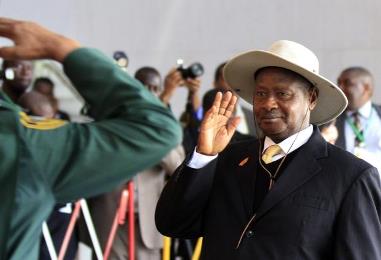S. Sudanese rebels welcome direct negotiations with Ugandan president
June 11, 2014 (ADDIS ABABA) – A spokesperson for the leader of the South Sudanese armed opposition faction, Riek Machar, said the SPLM/A in Opposition welcomed the recent direct face-to-face negotiations between Machar and the Ugandan president Yoweri Museveni on the sideline of the Tuesday IGAD regional leaders’ summit in the Ethiopian capital, Addis Ababa.

The rebel leader’s spokesperson claimed that the Ugandan president was “imposing his will” on president Salva Kiir and that his direct engagement on certain issues such as withdrawal of his forces was crucial.
“We knew all along that president Museveni is the co-architect of the 15th December crisis in South Sudan and his continued influence on Salva Kiir’s decisions has negatively impacted on the peace process,” Dak claimed, adding that “it was worth it to also negotiate directly with Museveni on withdrawal of his forces from South Sudan.”.
Dak explained that during the Addis Ababa interactions between the two rival leaders in the presence of other regional leaders, Museveni was seated next to President Salva Kiir and was the main speaker negotiating on behalf of the South Sudanese president.
The rebel leader’s spokesperson added that president Museveni agreed to pull out his troops from South Sudan in implementation of the cessation of hostilities agreement which demanded the withdrawal of all foreign forces from South Sudan.
He however said it remained to be seen if the Ugandan president meant his words, underlining that in the past he resisted to withdraw his troops since 23 January when the first agreement on cessation of hostilities was inked.
The Ugandan People’s Defence Forces (UPDF) were deployed in mid-December last year to help protect and secure the leadership of president Salva Kiir amidst violent conflict which erupted between the leading figures of the ruling party (SPLM).
FORMATION OF TRANSITIONAL GOVERNMENT
Dak explained that the “verbal” agreement reached on Tuesday in Addis Ababa between president Kiir and rebel leader Machar was a recommitment by the two rival leaders to respect the previous agreements they signed and to further address the root causes of the crisis with the aim to reach a peace agreement within 60 days on future governance of the country.
He said the proposed formation of the transitional government will come at a later stage of the 60 days negotiations as a product of the would-be peace agreement.
“We want a peace agreement that provides for restructuring of the state on the basis of a federal system of governance. We are ready to table and negotiate this popular demand of the people within 60 days. The question of which leadership or government should be entrusted to implement that agreement or programme will come as a final touch in the negotiations,” Dak further said.
Dak pointed out that it was going to be meaningless if the two parties were rushed to forming a transitional government without first addressing the root causes of the conflict.
“The two rival factions were in the same government before the crisis. To just tell them to get back together in that government without addressing the root causes of the crisis and reaching a peace agreement to change the status quo would be like giving them a short break and deferring the crisis only to reignite in the near future,” he argued.
South Sudan government has however been resisting the rebel group’s call for a federal system of governance as leaders and intellectuals of Greater Equatoria civil society groups have come out in support of federalism .
KIIR RENEWS COMMITMENT
In Juba, South Sudanese president vowed commitment of his administration to implement the agreement he had reached with his former-deputy turned rebel leader, Riek Machar, saying it has been his desire to ensure peace and stability in the country.
We (struck this deal) “because it has been our desire to bring peace and stability in the country. We want the people who have been affected by this conflict to return to their homes as soon as possible,” President Salva Kiir told members of the government delegation after signing the deal with the rebel leader Riek Machar, in Addis Ababa, Ethiopia, on Tuesday night.
The six month conflict in South Sudan has left thousands dead and forced around over a million people to flee their homes.
The failure to implement the signed agreements, particularly the 23 January ceasefire, have attracted both local and international concerns, prompting regional leaders to warns the rival parties of intention to take unilateral action, including sanctions to bring peace in the country.
Ethiopian Prime Minister, Hailemariam Desalegn, who announced late Tuesday the new agreement between the rival leaders, said the region would act to bring peace should the two sides failed to implement it.
“They (Kiir and Machar) agreed fully to commit themselves to the already signed agreements and to complete all negotiations within the coming 60 days and then establish a transitional government of national unity,” Prime Minister Desalegn told reporters after the meeting late on Tuesday.
(ST)
